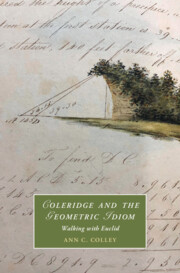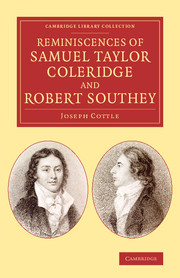Coleridge and the Geometric Idiom
Walking with Euclid
£85.00
Part of Cambridge Studies in Romanticism
- Author: Ann C. Colley, State University of New York, Buffalo
- Date Published: March 2023
- availability: Available
- format: Hardback
- isbn: 9781009271752
£
85.00
Hardback
Other available formats:
eBook
Looking for an inspection copy?
This title is not currently available on inspection
-
When Coleridge described the landscapes he passed through while scrambling among the fells, mountains, and valleys of Britain, he did something unprecedented in Romantic writing: to capture what emerged before his eyes, he enlisted a geometric idiom. Immersed in a culture still beholden to Euclid's Elements and schooled by those who subscribed to its principles, he valued geometry both for its pragmatic function and for its role as a conduit to abstract thought. Indeed, his geometric training would often structure his observations on religion, aesthetics, politics, and philosophy. For Coleridge, however, this perspective never competed with his sensitivity to the organic nature of his surroundings but, rather, intermingled with it. Situating Coleridge's remarkable ways of seeing within the history and teaching of mathematics and alongside the eighteenth century's budding interest in non-Euclidean geometry, Ann Colley illuminates the richness of the culture of walking and the surprising potential of landscape writing.
Read more- Reveals Coleridge's training in and use of Euclidean geometry to a wide readership, as well as the influence this exerted as he described the landscape and discovered patterns of meaning in both his prose and poetry
- Takes Coleridge's account of his rambles as a starting point to explore the rich culture of walking, showcasing diverse ways of describing and perceiving one's surroundings
- Demonstrates Coleridge's peripheral involvement in recognizing a “wild” or “organic” geometry, closely connected to non-Euclidean systems, and offers avenues for research into the entanglement of the sensual appreciation for one's surroundings with the more abstract concept of the geometric figure
Reviews & endorsements
'Given how young many of the Romantics were when they first started demonstrating remarkable language and thinking skills, it seems a wise move for scholars to investigate their education in school and university, and to consider the poets' experiences following immediately upon leaving these institutions in their critical studies. Colley's book is a fine addition to this field of study.' Catherine Ross, The Coleridge Bulletin
Customer reviews
Not yet reviewed
Be the first to review
Review was not posted due to profanity
×Product details
- Date Published: March 2023
- format: Hardback
- isbn: 9781009271752
- length: 205 pages
- dimensions: 236 x 157 x 14 mm
- weight: 0.47kg
- availability: Available
Table of Contents
1. Coleridge walks: the measure of the landscape
2. Lines of motion
3. A geometric frame of mind
4. Ars Poetica
5. Youth and age: Coleridge and the shifting paradigm of geometric thought.
Sorry, this resource is locked
Please register or sign in to request access. If you are having problems accessing these resources please email [email protected]
Register Sign in» Proceed
You are now leaving the Cambridge University Press website. Your eBook purchase and download will be completed by our partner www.ebooks.com. Please see the permission section of the www.ebooks.com catalogue page for details of the print & copy limits on our eBooks.
Continue ×Are you sure you want to delete your account?
This cannot be undone.
Thank you for your feedback which will help us improve our service.
If you requested a response, we will make sure to get back to you shortly.
×







